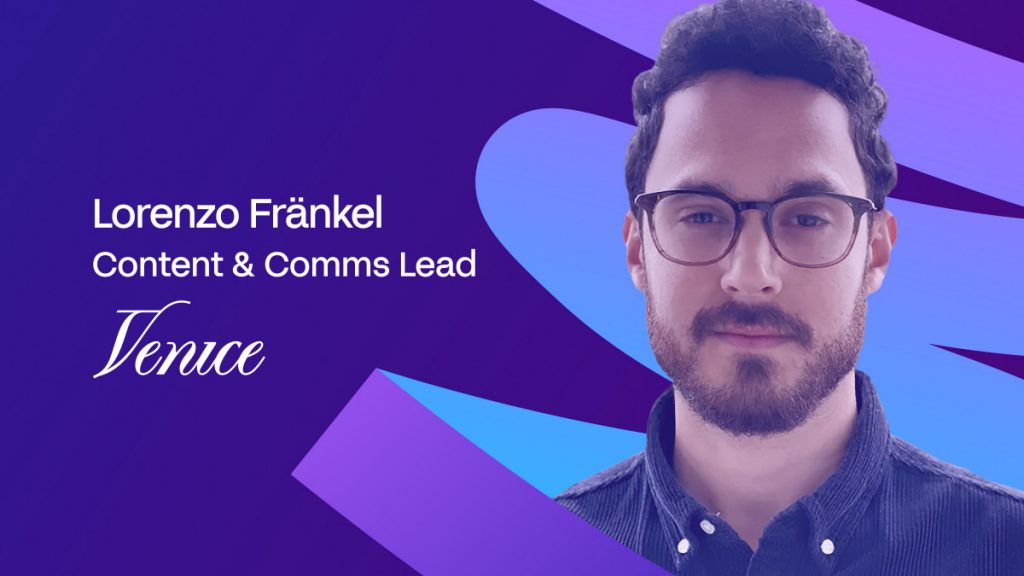Inside the AI Rebellion Venice Is Building a Private Future


In Brief
Venice, a startup constructing private, uncensored AI, has surpassed one million users, challenging the surveillance-driven norms of mainstream AI platforms and paving the way for a future without compromising privacy.

Venice recently surpassed one million users—an impressive milestone for a startup building private, uncensored AI from the ground up. In this interview with Lorenzo Fränkel, Content & Comms Lead, we explore how Venice is challenging the surveillance-driven status quo of mainstream AI platforms, what “permissionless intelligence” really means, and how the team is shaping a future where users don’t need to trade privacy for performance.
Can you please share your journey into Web3?
I got into Web3 in 2017. The first crypto I ever bought was Ethereum on Coinbase, which is why I’m pretty excited about going to EthCC in Cannes. That was my first entry point, but I think most people need two nudges to truly understand something. For me, the second was in 2019, when I did my first swap on Uniswap. That’s when it really clicked, realizing we’re building permissionless, decentralized finance and taking power away from intermediaries. That moment made the mission clear to me.
Since then, I’ve worked on several projects, including Immutable in the Web3 gaming space. Then in March or April 2024, I saw a tweet by Erik Voorhees looking for developers for a stealth project. I replied, saying I wasn’t a developer, but I worked in communications. He actually DMed me, which I initially thought was a scam because it’s Erik Voorhees, he’s one of the biggest names in crypto. But it was really him. I had a call with him and our COO, Teana, and joined the team in April.
Back then, we were only about 6–7 people. Now we’re over 25, and we’ve just surpassed 1 million users who use Venice for private and uncensored AI. I really connected with the mission. I’ve been an AI power user for years, but I always felt uneasy about how much information we share with these tools. Venice’s goal to build private, uncensored AI really resonated with me.
Why is there a need for private and uncensored AI? What makes it different from other platforms?
I think we already made a big mistake with social media, and we’re on the verge of repeating it with AI, except the stakes are even higher. The amount of personal, intimate data people share with AI tools is massive. People use AI as companions, life coaches, or therapists, and they’re not just sharing with the tool, they’re sharing with OpenAI, Google, Anthropic, etc.
We’ve seen how companies exploit data, and it’s not just about that. Holding such data makes it vulnerable to hacking, government access, and more. The situation was already bad before AI, with scandals like Cambridge Analytica. But with AI, people are volunteering this data. We see Venice as the antidote to this next phase of surveillance.
How does Venice ensure user prompts and responses remain private? How is inference handled?
We built Venice’s privacy architecture from the ground up. All user prompts are saved locally in the browser. The prompt then goes to our proxy server, which acts as an intermediary to obscure user identity. From there, it’s sent to our decentralized GPU infrastructure, where the model processes it.
The response comes back through the proxy and is streamed to the user. We’re working on third-party and independent proofing so users can verify that their prompts are only processed this way. Right now, you kind of have to trust us, but we’re prioritizing transparency and verification.
We also give users control over basic telemetry like sign-ins. You can even turn that off. Of course, users want privacy, but they also expect an app that works smoothly, so we collect minimal data strictly to improve the experience.
What does “permissionless intelligence” mean, and how is Venice aligned with that philosophy?
Our core principle is privacy and uncensored access. However, permissionlessness takes it a step further — it means that no approval is required to use the technology. Recently, OpenAI announced it might start requiring ID for API access. That’s the kind of control we oppose.
With Venice, you don’t even need to create an account to start using it. We believe this powerful technology should be accessible to everyone without restrictions. We also don’t censor outputs. I don’t want an AI to say, “Sorry, I can’t help with that.” I want raw intelligence, as it was meant to be.
We partnered with Dolphin, who specializes in uncensored models, to create Venice Uncensored. It has less than a 2% refusal rate based on our censorship benchmarks, much lower than other models like ChatGPT, Gemini, or Llama. We don’t believe AI or the internet should be permissioned.
How do you categorize the models you offer? What criteria define each category?
Each model has a different use case. Venice Uncensored is our default multipurpose model. It’s versatile, creative, and accessible, even for anonymous users. Then there’s Venice Small, super fast and great for mobile use. Venice Medium is vision-enabled and great for analyzing images, even medical ones, securely.
Venice Large is best for complex reasoning and handling large files like PDFs or transcripts. It has a bigger context window. Then we have Venice Reasoning, which is best for multi-layered problems that require deeper thinking.
We also test models internally and track chatter on social media. We try to strike a balance between hosting the best open-source models and offering a curated experience.
Have you seen improvements in latency and user experience after streamlining your model lineup?
Yes, definitely. By retiring underused models like DeepSeek, which took up a lot of inference capacity, we improved overall speed. Venice Uncensored, a fine-tuned Mistral 24b model, now serves a broader user base and delivers much faster performance.
Besides Dolphin, have you formed any strategic partnerships with enterprise sectors like finance or healthcare?
We’re actively exploring those partnerships. Privacy is especially relevant in sectors like healthcare and law. We’ve started discussions with organizations, including universities like Oxford. These are early conversations, but we see a real opportunity there.
As a privacy-first decentralized AI platform, how do you plan to compete with big players like OpenAI and Google?
We’re open-source maximalists. Even though open-source models might lag a bit behind closed-source ones, we believe in the power of the open-source community. It’s the same ethos as Ethereum: decentralized, collaborative development.
Despite being a small team, we serve over a million users. That gives us the agility to pivot quickly and deliver real value. It’s our scrappy, lean approach versus the behemoths of AI.
What’s next on Venice’s roadmap? Are you exploring things like FHE, local model deployment, or APIs for agents?
Two main things: First, our mobile app is currently in beta testing and will be launching soon; it’s been in high demand. Second, we just launched a $27 million incentive fund for projects using our private, uncensored API. We’ve already received over 100 applications and will soon begin onboarding.
We also have a few more developments in the works that I can’t share yet. However, improving the app experience and expanding our ecosystem are top priorities.
Disclaimer
In line with the Trust Project guidelines, please note that the information provided on this page is not intended to be and should not be interpreted as legal, tax, investment, financial, or any other form of advice. It is important to only invest what you can afford to lose and to seek independent financial advice if you have any doubts. For further information, we suggest referring to the terms and conditions as well as the help and support pages provided by the issuer or advertiser. MetaversePost is committed to accurate, unbiased reporting, but market conditions are subject to change without notice.
About The Author
Victoria is a writer on a variety of technology topics including Web3.0, AI and cryptocurrencies. Her extensive experience allows her to write insightful articles for the wider audience.
More articles

Victoria is a writer on a variety of technology topics including Web3.0, AI and cryptocurrencies. Her extensive experience allows her to write insightful articles for the wider audience.


















































